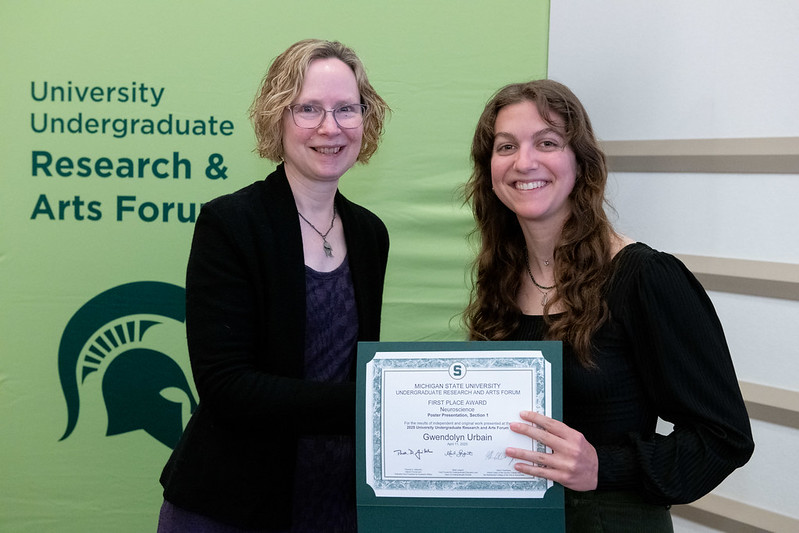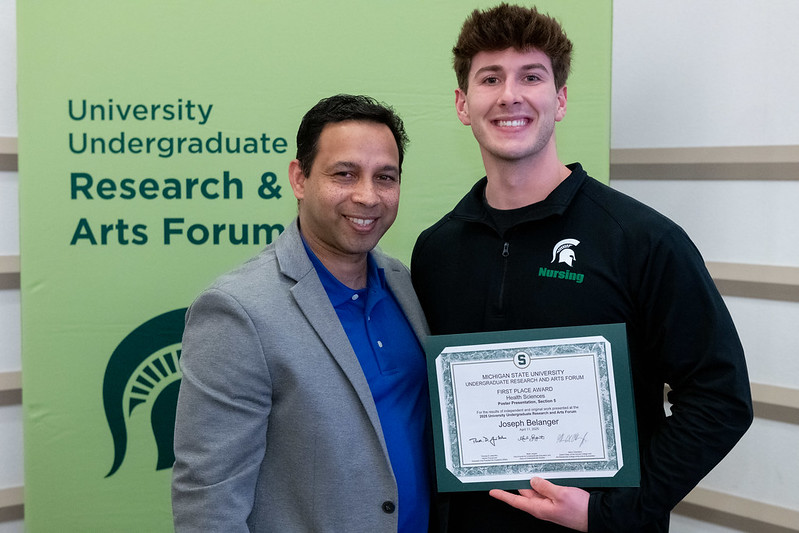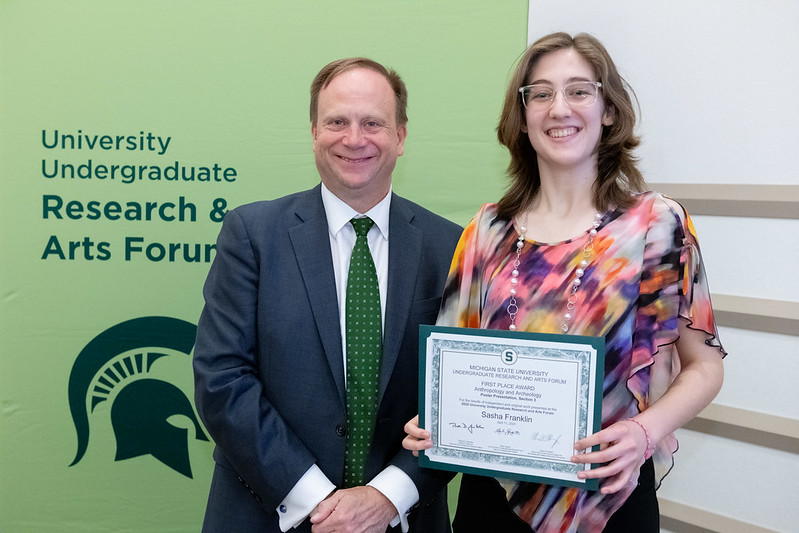Driven by discovery: MSU undergraduates awarded 2025 UURAF grand prizes
Projects explored stress and hormonal cycles, virtual reality in health testing, and digital archaeology education
Three Michigan State University undergraduates were selected as grand prize winners for their submissions at the 27th annual University Undergraduate Research and Arts Forum (UURAF), on April 11, 2025, recognizing their outstanding contributions to research and creative scholarship. The annual event, co-sponsored by the Undergraduate Research Office and the Honors College, drew over 1,000 student participants from across disciplines, showcasing the breadth and depth of undergraduate inquiry at MSU.
“Every year, UURAF showcases the incredible talent, curiosity, and dedication of MSU’s undergraduate researchers,” said Brian Keas, director, Undergraduate Research. “Undergraduate research experiences transform classroom learning into real-world impact, giving students the confidence, skills, and experience they need to succeed in school and in future careers.”
“By working alongside faculty on meaningful projects, students develop critical thinking, communication, and problem-solving skills as they discover their passions and clarify career goals,” Keas elaborated. “This hands-on experience fosters independence, creativity, and collaboration, qualities that are essential for graduate study and competitive careers, while helping students build professional networks and approach challenges with curiosity and perseverance.”
This year’s grand prize recipients were in the science, technology, engineering and mathematics, or STEM category (tie), and the arts, humanities and social sciences category.
Grand prize recipients
Gwendolyn Urbain, a neuroscience major in the College of Natural Science, was recognized for her project, “Mild Stress Alters Mouse Estrous Cycle.” Under the mentorship of Dr. Geoffroy Laumet, Urbain investigated how mild, repeated stress affects hormonal cycles in female mice—a model for understanding how everyday stressors may contribute to chronic disease risk in women.
For Urbain, participating in UURAF was a transformative experience that solidified her passion for scientific inquiry and set her on a path toward a future in neuroscience. “Participating really made me realize that research is something I want to pursue full time. Presenting at UURAF gave me the chance to demonstrate the skills I've learned in the lab and allowed me to delve deeper into my project's purpose and real-world implications,” she explained. “I am currently writing a publication about my findings which wouldn't have been possible without the opportunities afforded to me here at MSU. UURAF and this project gave me the opportunity to see if research is a career I wanted to go into, and now they have paved the way for me to start applying to Neuroscience Ph.D. programs this fall.”
Urbain also credited her mentors for playing a pivotal role in her development as a researcher. “Both my faculty mentor Dr. Laumet, and my graduate student mentor, Alex Chapman, were instrumental in my research experience,” she remarked. “They provided a safe learning space for me to grow as a researcher and person, and I cannot thank them both enough for how positive they have made my experience.”
Joseph Belanger, a health sciences student in the College of Nursing, received the grand prize for his innovative study, “Feasibility of Using Immersive Virtual Reality for a 6-Minute Walk Test in Young Adults.” Working with mentor Dr. Pallav Deka, Belanger explored whether virtual reality (VR) could be a reliable and accessible alternative to traditional cardiovascular fitness testing. Using the Holofit VR application, participants completed walk tests in both real and virtual environments.
Reflecting on his experience at UURAF, Belanger shared how the research journey shaped him both professionally and personally. “Participating in the UURAF research project taught me the true value of dedication and perseverance through the year-long journey. Beyond the research, I gained invaluable networking opportunities, connecting with esteemed colleagues, students, and mentors; all of which have left a lasting impact on me,” he said. “My research project provided me with a deeper understanding of the advancements in patient care and the crucial role technology plays in this field. I am eager to continue my research, testing the use of these technologies in a clinical setting to potentially improve patient outcomes.”
Belanger also emphasized the influence of his mentor, Dr. Pallav Deka. “I am fortunate to have been part of his research team,” Belanger remarked. “Dr. Deka’s mentorship extended beyond lectures and research; it encompassed the real world, helping me develop as a researcher, a man in nursing, and a young man. His expertise and guidance were instrumental in my learning journey, and I am incredibly grateful for the valuable lessons I gained. I plan to continue researching and applying for graduate school, inspired by Dr. Deka’s mentorship and influence.”
Sasha Franklin, a recent anthropology and archaeology graduate in the College of Social Science, received the grand prize for her project, “Archaeology Education in the Digital Age: Sharing History Through ArcGIS StoryMaps.” Mentored by Dr. Gabriel Wrobel, Franklin developed an interactive digital education tool using photogrammetry and GIS software to teach ancient Maya history and archaeological methods. The StoryMap includes sample lessons designed to engage students and descendant communities, making archaeological knowledge more accessible and inclusive.
Franklin’s participation in UURAF strengthened her ability to collaborate across disciplines and connect with researchers in her field. “My research project taught me how to collaborate with numerous partners, including international scholars, archaeologists, and educators,” Franklin explained. “I also learned how many people were interested in learning about archaeology if only that information was made accessible to them. Presenting at UURAF (I have presented five projects in three years now) has made me very comfortable with the format of academic presentations, and with communicating my research to the public. This year, my presentation helped prepare me for a national conference with the Society for American Archaeology.”
She credited her mentor for encouraging her creativity and independence throughout the research process. “My faculty mentor, Dr. Wrobel, helped me create a network of people who supported and contributed to my project,” she said. “He prompted my imagination with several big ideas and then allowed me to tailor my research entirely to my passions.”
The 2025 UURAF event highlighted the creativity and impact of undergraduate research at MSU. From health sciences to digital humanities, this year’s winners exemplify the incredible inquiry and innovation at every level of undergraduate student. Grand prize recipients also received a $500 award.
To learn more about MSU Undergraduate Research and opportunities for undergraduate students that enhance classroom and educational experiences visit urca.msu.edu.


